Reviews
Taxidi Sta Kithira
Theodoros Angelopoulos
Greece, 1983
Credits
Review by Jonathan Foltz
Posted on 19 November 2012
Source Artificial Eye DVD
Categories Taking Time: The Cinema of Theodoros Angelopoulos
What is that dreary island—the black one there? Cythera, someone says, the one in the song banal Eldorado of old-timers: it isn’t much of a place, as you can see. [… ] On Aphrodite’s island all I found was a token gallows where my image hung… Lord give me strength and courage to behold my body and my heart without disgust!
—Charles Baudelaire, “A Voyage to Cythera”
There is a reason that Cythera - land of Aphrodite and the site of many pastoral dreams of love and utopian happiness - is an island. The distant geography of the ideal alerts us that one of the chief mysteries of idealized romance is that it separates us from the people and places we love. This means that love, despite the halo of warmth that sometimes accompanies its promise, just as easily invites abandonment, exile, and melancholy. To return to the enigmatic site of love is to become disappointed archeologists, morbidly sorting through the rubble of the past. To the roving mind of Charles Baudelaire, the profligate poet and high priest of modern dissipation, the name for this forsaken love is Cythera. The island of Cythera, he writes (in the poem from which Theo Angelopoulos took the title of his 1983 film), is “revered forever by all mortal men” as the place where the goddess of love floats around “like a fragrance,” a “voluptuary ghost,” and yet it is also strangely barren, uninhabited (“now nothing more than a thistled promontory / vexed by the wheeling gulls’ unruly cries”). Peeking closer, we discover that what the speaker initially takes to be a tree on the horizon is in fact a “branching gallows-tree” where birds are “ravaging the ripe corpse hanging there, / driving their filthy beaks like cruel drills / into each cranny of its rotten flesh.” This eyeless, pecked and mottled corpse, the speaker says, is his own double: “rapture’s child,” the true “Inhabitant of Cythera.”
There is no question that Angelopoulos, who spent a number of years studying in France before returning to Greece, drew on Baudelaire’s grim poem for his hazy picture of Cythera as the icon of disappointment. Still, Cythera is also a real place, its politics and provincialism coinciding uncomfortably with the gothic fever dreams foisted upon it by foreign poets. Angelopoulos’ characteristically diffuse and beautiful film engages both the longing of a personal lyricism with the more ordinary weightiness of political history, without feeling obliged to anchor us recognizably in any one register. Voyage to Cythera’s drifting tone and bewilderingly unmoored style creates a feeling of dense, deliberate ambivalence about both its themes and characters. At once a love story (about an aging patriarch estranged from his wife and family) and a political allegory about the faded dreams of the post-war Left, Angelopoulos’ film stretches these unmistakably Significant Themes to the point where we have trouble recognizing them anymore, except to see the angle where they are eclipsed by a world of striking visual dynamism and delirious scale. By encouraging a rapturous disattention to the perspective (and sometimes even the location!) of its main characters, Voyage to Cythera installs a distance between the viewer and the world of the film almost as great as those the separate the characters from each other. It would be easy to misunderstand the rigor of Angelopoulos’ filmmaking, which in its long-take style evokes a familiar aesthetic of strident visual alienation (from the modern anguish of Antonioni to the mystical revelations of Tarkovsky). But Voyage to Cythera is remarkable for the way it seems to push back against the ostentatious statement-making cinema whose style it inherits. There is a wonderful, almost illegible, banality in Angelopoulos’ modernist style here, an uncommon naturalness in the film’s baroque compositions that could almost distract us from the apocalyptic world that we are left to sort through in the devastating final frames. This is minimalist cinema wonderfully unredeemed by the self-awareness it creates, and reveling in the prosaic ability of the camera to denature our sense of action.
Anyone who promises to summarize a film like Voyage to Cythera should immediately arouse your suspicion. This is because even basic elements of the plot, the identity and relationships of the characters, are insistently withheld, remaining speculative even after a second viewing. Delaying, and even leaving out, so much crucial narrative information, Angelopoulos is a practitioner of that special brand of cinema that reduces his commentators to a keen state of embarrassment. That said: Voyage to Cythera is ostensibly the story of Alexandros—a dour, be-spectacled director making a film about an old dissident, Spyros, returning from over 30 years of political exile in Russia to rejoin (and then run away from, and then rejoin) his wife, daughter and son (played by the film-with-a-film by an identically clad Alexandros). The unstable, barely-speaking, family decides to take a trip to visit their old cottage out in a small village community. After reconnecting with one of his revolutionary comrades - through a wonderfully strange language of bird-calls, formerly used as “outlaw code” - Spyros finds that his farmland, laying fallow these thirty years, is about to be sold to a company intent on building an expensive resort (a fairly unlikely venture given the remote, wasteland-ish, countryside!). Unwilling to sell, Spyros spoils the plans of the entire community, disappears again (and is found again), before being arrested by the police, stripped of his citizenship, and finally - because the ship meant to deport him has already left - sailed out to a small raft kept floating in international waters, where the police intend to leave him, unguarded, unfed, and generally unattended, until the government decides what to do with him. In a final gesture of desperation, Spyros’ estranged wife, Katarina - who can’t bear to see him shunted out of her life a second time - asks to join him on the raft. Once reunited, Katarina and Spyros untie the rope holding them in place, and, in an unforgettable final shot, drift off together into the misty ocean: without a country, without a family, and in a situation which we would feel certain is going to lead to a slow death if the shot weren’t already so derealized by style as to seem indemnified by the deathlessness of metaphor.
As you might be able to tell from this brief summary, quite a lot happens in Voyage to Cythera for a film ostensibly indifferent to the dramatic urgencies of plot. Indeed, one of the mysteries about the film is the sense in which Angelopoulos’ style forestalls the eventfulness of what happens - using the “dedramatized” sequence shot aesthetic that David Bordwell associates with European art cinema - but also drives the plot forward, introducing new relationships and recalibrating old ones in almost every sequence of the film. Early in the film, we find Alexandros, in his role as director wandering around the studio during a large casting call, which has already begun as he arrives. It is a group audition, with scores of old men, in dusty suits, standing against a curved white wall. One by one, each old man walks up to the casting director and utters a nondescript (if philosophically over-determined) line - “It’s me” - before exiting the set immediately afterward, without waiting for any kind of signal of judgment or appraisal. It’s a confusing, and absurdly funny scene where the monotony of the actors saying the same line approaches a strange sort of cacophonous hum. The duration of the scene is complicated, too, for what we notice first is the strange hilarity of this repetition but Angelopoulos maintains the take long enough to let the initial humor drift into a numbed kind of normalcy. No one seems clear on what is being looked for. Alexandros makes no comment and eventually just walks away. It is as though the audition has been going on interminably, though it would seem from the obscure dialogue (and from Alexandros’ apparent indifference) that it is only a bit part, an insignificant detail in a film with more important matters for him to attend to. Of course, it will later be revealed that the part is for Spyros himself, the lead of the film! It is as though the film were not so much narrating these events or relationships, but planting seeds of events which the audience will be able to recognize only later. This part of the film’s cruelty, but also its black sense of humor. In the moment it feels like nothing is happening, but in retrospect it’s easy to be awed by just how densely orchestrated that emptiness had been.
Following this shot, Alexandros walks out of the set and onto the lot (now crowded with dejected actors looking for a signal of approval!) where he enters a café. After exchanging some words with an actress (who we learn is also his mistress), Alexandros sidles up to the bar and stares silently for a few moments before catching sight of a new old man, not an actor from the audition, who comes in selling stalks of lavender. Mesmerized by the man’s reflection in a mirror, Alexandros wanders out of the café to follow him, flagrantly leaving his mistress essentially mid-conversation, tracking the old man obsessively down the street, through the subway and eventually down to the docks. Why is he following him? We don’t know at first, though it will later become clear that he has discovered the “right” old man for the part. Again, a moment that initially seems like a distraction from the main action of the scene grows enormously in importance—but only later. Alexandros’ exchange with his mistress is also significant (we later discover that part of what she says to him is an excerpt from the film’s script) but no one would think so based solely on his blank, indifferent reaction during the scene. What this suggests is that Angelopoulos is obliging us to adjust our viewing. It is not that the scenes contain no dramatic or narrative element; rather, whatever narrative we uncover from the film we discover first by way of a deliberate indirection and subsequent formal resonances. That is, the narrative itself is never given, but always reconstructed by the audience. Angelopoulos’ wandering camera - which fixates on seemingly irrelevant details and constantly pulls away from individual characters to show their disposition in space - is presciently preparing us to make connections whose significance we will have to tease out only after the shot is over.
This makes the film’s disorientation just as important as its compositional beauty, because what we experience first as confusion we rediscover later as a structuring element, a formal doubling or counterpoint. Later in the film, when we find the group of villagers arced around a table to sign away their land in the business deal that Spyros will later sour, we recognize the scene (and perhaps also the actors!) from the casting call, walking up as their name is called to answer “present” instead of the prior “It’s me” (a line that also swims through the film in different incarnations). After Spyros has been sequestered to his Kafka-esque floating Guantanamo, the family takes shelter during a rainstorm in a station by the water while a band performs songs as preparation for a workers festival. It is a scene that at one moment we watch reflected in a mirror and in the background, as Alexandros - out of focus - stands in front of us, listening to Voula explain her sexual encounter with a strange man a few seconds before: “Sometimes it happens that I no longer believe in anything. At these times I turn back to my body,” she says, “it’s the only thing that reminds me that I’m alive”—the same line of dialogue that the actress, Alexandros’ mistress, had recited back in the lot café when he found himself entranced by the old man’s image reflected in the mirror (does she also play this part in the film?). In this way, the audience is consistently thrown back to a previous spot in the film and asked to momentary pieces of visual and auditory information to make sense of the mysteriously unfolding, and increasingly absurd, present. The ball which Alexandros rolls to the feet of his son (also named Spyros) is reincarnated in the apple that rolls on the ground as Spyros (the elder) and Katarina sit in the train station. The melody that Alexandros finds himself recalling (and which is doubled on the soundtrack) as he walks through the rain-soaked streets after a late night rendezvous also mirrors Spyros’ secret bird-whistle code. In a film obsessed with the melancholic quality of returning to a past that no longer exists, Angelopoulos’ style continually mediates our viewing through the memory of what has come before. As we watch, we find ourselves sifting through details that initially seemed trivial to find buried correspondences that recur with the inexplicable structure of myth or allegory. This is a formal style, in other words, that is also a theory of history.
Perhaps, then, the film-within-a-film conceit is less important for what it shows about Alexandros’ state of mind than as a way of calling attention to the autonomy of style itself, its floating independence from any psychological position in the film. It is quite puzzling to read interviews with Angelopoulos which show how clearly autobiographical parts of the film were,1 and where Alexandros’ relationship with his film’s main character, Spyros, is described as a “sublimated father-son” relationship. Indeed, what is striking about Voyage to Cythera is just how unhelpful psychological readings become. Throughout the film, Alexandros is a dead wall of Bressonian impassivity—as is most everybody. “You’re dead,” says one of the villagers to Spyros, angry that he has returned to ruin their business deal, “A ghost. You don’t exist.” The same might be said of all of the characters in the film. But Angelopoulos finds ways of pulling such dizzying beauty out of these numbed revenants that we don’t mind too much their absent faces. Old Spyros, the embattled Katarina, and mercurial Voula—all (with the possible exception of Alexandros who is nothing but a cipher here) convince us that there is something essential being disclosed in their Bartleby-like reluctance to take part in the world around them. Nobody in the film even bats an eye when Spyros is dragged out to his floating holding-cell where he is exposed on the ocean to winds and rain. They are making preparations for a festival! Every absurd development is treated with inhuman deadpan as if it were the habitual texture of the ordinary. After all, what could shock these characters, for whom everything has happened before—an uncanny knowledge reinforced by the obsessive use of long-take cinematography and sequence shots. It is as though Angelpoulos’ world were irremediably wounded by the fact of continuing to exist.
Voyage to Cythera is a film of astounding patience, subtlety and drift. Despite Angelopoulos’ evident meticulousness with his staging and the camera’s choreography, the film seldom seems overburdened with intention, symbolism and weighty commentary—as the films of Antonioni and Tarkovsky sometimes become. Even the final shot of the film - which is plainly allegorical - feels remarkably open-ended and anti-climactic (we are given no “The End,” for instance, to signal the movie’s conclusion). Part of Angelopoulos’ power is that although his films are deeply encumbered by the past - by Greek culture, politics and mythology, as well by the conventions of art-house filmmaking - Voyage to Cythera occasionally discovers a way of re-engaging the ordinary, the trivial, the momentary (all those hallmarks of modernism), a way, that is, of releasing the long-take of its overbearing symbolism. It would then come as no great surprise that the current incarnation of long-take film-making - now kept alive in Asian cinema - owes Angelopoulos perhaps a more profound debt than his oft-cited precursors. Tsai Ming-liang, to take a clear example, quotes the cataclysmic final image of Voyage to Cythera in his astounding film, I Don’t Want to Sleep Alone, replacing Spyros’ stateless drifting raft for the sexual alienation of Hsiao-Kang’s ethereal mattress. Anyone interested by the continued power of the long-take to animate contemporary cinema needs to revisit Angelopoulos, whose films have long been preparing the way for its survival.
- The fact that Angelopoulos dubbed all of the dialogue for Italian actor, Giulio Brogi, only adds to this autobiographical reading. ↩
More Taking Time: The Cinema of Theodoros Angelopoulos
-
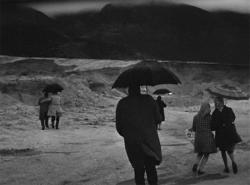
Reconstruction
1970 -
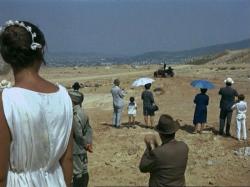
Days of ‘36
1972 -
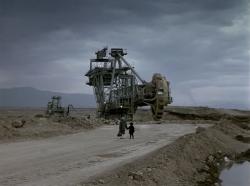
Landscape in the Mist
1988 -
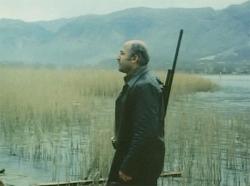
The Hunters
1977 -
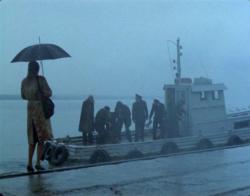
Voyage to Cythera
1983
We don’t do comments anymore, but you may contact us here or find us on Twitter or Facebook.



